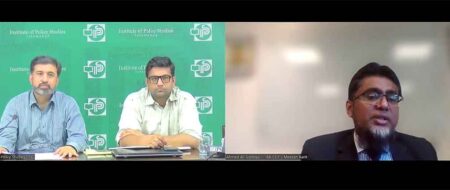‘Pak-Afghan border management and creation of new opportunities’
In wake of the growing security concerns on Pak-Afghan border areas and persistent tension over the Durand Line, a session titled ‘Pak-Afghan border management and creation of new opportunities’ was held at IPS on January 26, 2022.
The objective of the session was to deliberate ideas for bringing stability along the Afghanistan-Pakistan border in a bid to protect civilian population as well as to enhance confidence and reconciliation between the two neighboring countries.
A presentation on the topic was delivered by Najeeb Ullah, a trainee at IPS, whose talk covered the domains of border management, local engagements, emerging opportunities and security context, encapsulating the issues like the rule of law, security sector, institution building, dialogues and grand jirgas, creation of economic and social opportunities, and monitoring of entry/exit gates and routes.
The speaker also proposed different suggestions to counter the anti-Pakistan and Afghanistan sentiments and terrorism through soft means such as establishing industrial zones, markets, science and technology hubs, educational cities, hospitals, and sports grounds on both sides of the Pak-Afghan border areas. These kinds of measures, he viewed, will not only produce new employment opportunities for the locals but can also help obtain long-term peace and stability in the region.
The presenter also discussed the rising threat of the TTP and ISKP in the Pak-Afghan border region, terming it a matter of concern that needs collaborative countering measures from both sides.
IPS’ Chairman Khalid Rahman and Vice Chairman Ambassador (r) Syed Abrar Hussain appreciated the work done by the presenter, adding that the establishment of specific gates between the two countries will not only facilitate the movement of people from both sides of the border, but will also generate goodwill that can help reduce tension. They also suggested holding of jirgas among local tribesmen and other stakeholders to discuss different issues faced by the locals and the creation of new opportunities for locals in the border areas.



